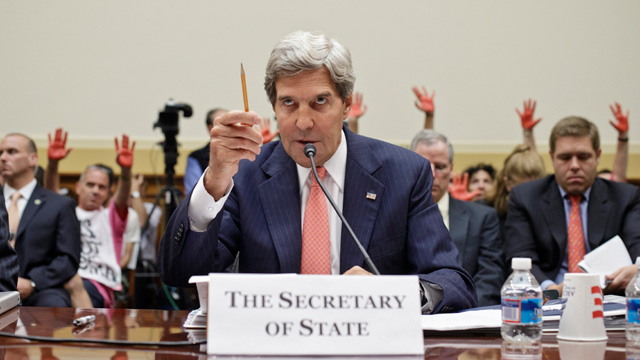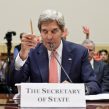
Syrian Jihadists React to the Threat of U.S. Military Intervention
Publication: Terrorism Monitor Volume: 11 Issue: 18
By:

Various reservations have been raised by the opponents of a military action in Syria by Western countries against the Bashar al-Assad regime for its alleged use of chemical weapons. Perhaps the most common of these objections was the one linked to the presence of jihadists in the Syrian armed opposition, which has been fighting a civil war for more than two years now after peaceful protests became militarized in reaction to the regime’s violent response. Many of those who oppose a military intervention in Syria suggested that the West, by planning a strike against the Assad regime, is standing by al-Qaeda and other jihadist organizations. However, the jihadists who have made progress in the battlefields of Syria and control different parts of the country have become major players in today’s Syria; therefore, understanding their positions regarding any future Western military action in Syria is important.
Though the Russian initiative to gather and destroy Syria’s chemical weapons stockpiles under international supervision has reduced the chance of a military strike in the short-term, U.S. Secretary of State John Kerry made it clear in an address to Congress that the administration still regarded limited military strikes as an option if the initiative fails to have results:
The initial reaction of the jihadists to what they described as an “anticipated Crusader strike” came from Abu Saad al-Amili, a strategist of the movement whose writings circulate widely on jihadist websites. Al-Amili, who posted his advice for jihadists through his Twitter account, considered that the any strike by the West would aim to “weaken” the Syrian regime but not “finish” it. He tweeted that the strike is designed to save face for the Western powers because the Syrian regime has defiantly used chemical weapons, therefore, according to al-Amili, the military strike would be limited and most importantly, it would target the jihadists in the sense of “hitting two [targets] in one attack.” Al-Amili believes that jihadists would be the “big target in order to blow up their infrastructure and to liquidate their leaders and soldiers easily.” Al-Amili warned the jihadists: “Do not forget that the enemy is superior with its air force weaponry.” The jihad strategist also reminded Syria’s jihadists to learn lessons “from your brothers in Afghanistan, Iraq and Mali, taking into account your special geographical and military circumstances.” He insisted that the West is primarily intended to keep the stalemate in Syria because “they fear the jihadists’ progress.” [2]
Another jihadist ideologue, Abdullah bin Muhammad, ruled out a large scale U.S. intervention in an interview posted on jihadist websites, but he predicts, like al-Amili, “disciplinary strikes” against the Syrian regime for using chemical weapons. Bin Muhammad thinks that the United States will resort to drone attacks against jihadists in Syria, claiming that the Americans have built one launching base in Jordan and intend to build another in Iraq soon. He thinks this U.S. strategy in Syria will be implemented when the fall of regime gets closer “to prevent Syria’s jihadists from attacking Israel” after the collapse of the Assad regime. [3]
These assessments by jihadist ideologues regarding a potential military action against the Assad regime were echoed in jihadists’ discussions on their forums and social media networks. Some reports even suggested that jihadists in Syria are taking extra security precautions after becoming convinced of the likelihood of military strikes (al-Masry al-Youm [Cairo], September 8).
Uncertainty over a military action against the Syrian regime has increased since the end of August when the British House of Commons rejected any British involvement in such an action (BBC, August 30). U.S. President Barak Obama, who seemed to be embarrassed for not acting earlier after describing the use of chemical weapons as a “red line” that would not be tolerated if crossed, eventually placed the possibility of military action against al-Assad in the hands of Congress. Furthermore, the top backer of the Assad regime, Russia, is expected to join China in vetoing any UN Security Council resolution approving an intervention.
Two main factors have played a major role in strengthening the presence of jihadists in Syria, in addition to the primary factor of course, which is the nature of the brutal campaign of the Syrian regime against civilians since September 2011. The first factor is the state of frustration among Syrians resulting from what they describe as the absence of international support for them despite a number of massacres committed against them. The second factor is the strength of jihadist narratives that exploit this frustration to recruit more local and foreign jihadists.
Only three days after the news circulated about the alleged use of chemical weapons by the Syrian regime against civilians in the eastern Ghutah area on the outskirts of Damascus, the influential jihadist group Jabhat al-Nusra posted an audio message by the group’s leader, Abu Muhammad al-Golani. Entitled “An Eye for an Eye,” al-Golani’s used his message to vow to take revenge for the Syrians killed in that attack:
Since al-Golani’s audio message, attacks on Alawite-dominated areas have increased, including a number of massacres reported by pro-regime sources. [5] Due to the complexity of the Syrian crisis where sectarian factors interact with both international and regional factors, Syria’s jihadists have succeeded in presenting simple answers to this complexity.
The narratives used by jihadists which center on “the West plotting against Muslims” or the sectarian nature of the conflict in Syria offer easy explanations that appeal to frustrated Syrians. The jihadist discourse is therefore prevailing in some areas in Syria as it provides an alternative to the confusion of a multi-factional civil war.
Murad Batal al-Shishani is an Islamic groups and terrorism issues analyst based in London. He is a specialist on Islamic Movements in the Middle East and in the North Caucasus. He is a regular contributor to several publications in both Arabic and English.
Notes
1. "Proposed Authorization to Use Military Force in Syria," Testimoney, John Kerry, Secretary of State: Opening Remarks before the House Armed Services Committee, Washington, D.C., September 10, 2013, https://www.state.gov/secretary/remarks/2013/09/214028.htm.
2. Al-A’mili’s Tweets were collected on this Facebook page: https://www.facebook.com/photo.php?fbid=213206022175480&l=218a6625d7.
3. The full text of the August 24, 2013 interview can be found here: https://app.box.com/s/4u239o63cexcwfyfes01.
4. Shaykh Abu Muhammad al-Golani “An Eye for an Eye,” al-Manara al-Bayda Media, August 24, 2013, https://ansar1.info/showthread.php?t=46827.
5. See for example, al-Hadath News, September 11, 2013, https://www.alhadathnews.net/archives/99639.





